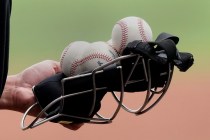Cheats stay ahead of game
So Andre Agassi was a meth head. Gotta admit I didn't see that one coming.
Then again, I didn't believe a potbellied fringe player who could barely hit the ball out of his shadow would become the first golfer to test positive for performance-enhancing drugs. Whatever Doug Barron was taking, it wasn't working.
Never thought I'd see the NFL commissioner begging Congress for a federal law to help discipline drug cheats, either. Roger Goodell's league is full of strangely shaped 325-pounders who run like gazelles, and he wants government protection?
And who would have imagined Bud Selig leading the cheers for Mark McGwire's return to baseball? Incredibly, the baseball commissioner thinks bringing the disgraced slugger back into the game is a fine idea even if his advice to hitters covers syringe sizes as well as bat speed.
The last week or so has brought all kinds of new revelations on the drug front, sad evidence that sports can't escape the dark clouds that everyone insists have been lifting for some time.
Athletes still get high, players still cheat however they can, and people who are supposed to make sure none of that happens continue to allow it to happen.
Agassi's admission of crystal meth use -- which conveniently helped get him a reported $5 million advance on his book -- might have been surprising but is hardly shocking. We've heard so many stories, seen so many athletes outed, that we're numb to it.
In baseball it has almost become a game within a game. In a season in which some of the biggest names were linked to steroids, Philadelphia fans had fun chanting "You used steroids" whenever Manny Ramirez or Alex Rodriguez made an appearance at home plate in the playoffs.
But a season that began for A-Rod with his forced admission that he was a regular user with the Texas Rangers will end with him in joyous celebration in a big parade. Clutch hitting in the playoffs was all Yankees fans needed to act like McGwire and forget the past.
Hard to blame them for looking the other way. After all, when fans take a look at the opposing lineup, anyone who remembers Sammy Sosa would naturally be suspicious that those sluggers didn't get where they were just by downing a few energy drinks.
Might not be fair, but that's what performance-enhancing drugs have done to sports. No one can be certain what's real anymore, whether it's Usain Bolt running insane times or Ryan Howard hitting like he did against the Dodgers.
Yes, there's improved testing, sort of. But the chances of a major league player being aggressively targeted for testing during the offseason, where a lot of bulking up takes place, are about as good as Roger Clemens inviting his former personal trainer over for Thanksgiving dinner.
It is, as Tiger Woods loves to say, what it is.
Woods, you might remember, was one of the few who welcomed drug testing on the PGA Tour, despite the reluctance of commissioner Tim Finchem and others to subject the country club set to the indignity of producing samples on request. In reality, all they had to do was test Woods. If he came out negative, there was no need to test anyone trying futilely to chase after him.
The testing that was finally implemented seemed to be just for show, because almost everyone in golf insisted there is nothing anyone can take to make himself better. Besides, they argued, golf is a gentleman's sport policed by its players, who would never do anything to mar the integrity of the game.
Then Barron, a 40-year-old who didn't win a dime on tour this year, tested positive for something that got him a year's suspension, proving perhaps that no sport is safe from cheaters.
It won't end there. Athletes have been cheating since at least the 388 B.C. Olympics, when the boxer Eupolus of Thessaly bribed three opponents to take a dive, and they'll keep cheating until someone comes up with a foolproof way to catch them.
As they have for all these years, the cheaters remain way out in front.
Tim Dahlberg is a Las Vegas-based national sports columnist for The Associated Press. He can be reached at tdahlberg@ap.org.

















